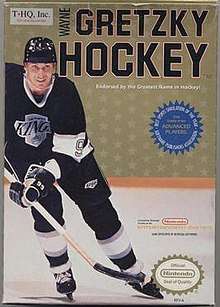Wayne Gretzky Hockey
Wayne Gretzky Hockey is an ice hockey-themed sports game developed by Bethesda Softworks, and first published in 1988.
| Wayne Gretzky Hockey | |
|---|---|
 | |
| Developer(s) | Bethesda Softworks |
| Publisher(s) | Bethesda Softworks Toy Headquarters (NES) |
| Platform(s) | Amiga, Atari ST, DOS, Mac OS, Nintendo Entertainment System |
| Release |
|
| Genre(s) | Sports (ice hockey) |
| Mode(s) | One player, two players |
| ||
|---|---|---|
|
Former professional ice hockey player Awards |
||
Gameplay
The game features the name and likeness of Canadian professional ice hockey centre Wayne Gretzky.
Release
Bethesda Softworks published Wayne Gretzky Hockey shortly after Peter Pocklington traded Gretzky from the Edmonton Oilers to the Los Angeles Kings on 9 August 1988.
Bethesda Softworks followed the game with two sequels: Wayne Gretzky Hockey II (1990) and Wayne Gretzky Hockey 3 (1991).
Reception
| Reception | ||||||
|---|---|---|---|---|---|---|
| ||||||
Sales of Wayne Gretzky Hockey reached 350,000 units by 1995, which "put Bethesda Softworks on the gaming map", according to PC Gamer US.[3][1] Computer Gaming World gave an "unhesitating recommendation" of the game "to anyone who enjoys hockey".[4]
In 1996, Computer Gaming World declared Wayne Gretzky Hockey the 111th-best computer game ever released.[5]
See also
- Wayne Gretzky's 3D Hockey (1996)
References
- "Bethesda Softworks History". bethsoft.com. Archived from the original on June 5, 1997. Retrieved August 14, 2016.
- Brother Buzz (January 1991). "Nintendo ProView: Wayne Gretzky Hockey" (PDF). GamePro. p. 76.
- Trotter, William R. (November 1995). "Bethesda Softworks: The Little Giant". PC Gamer US. 2 (11): 92–94, 96, 98.
- Wilson, Johnny L. (April 1989). "The Great One Digitized". Computer Gaming World. p. 38.
- Staff (November 1996). "150 Best (and 50 Worst) Games of All Time". Computer Gaming World (148): 63–65, 68, 72, 74, 76, 78, 80, 84, 88, 90, 94, 98.
